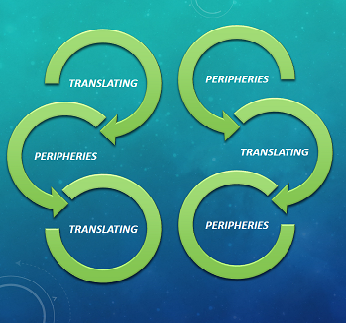The Power of the Periphery: Reassessing Spatial Metaphors in the Ideological Positioning of the Translator
DOI:
https://doi.org/10.21992/T9GS6TKeywords:
Translation, Positionality, Cultural Studies, Systems Theory, Spatial MetaphorsAbstract
Positionality in translation is often framed in terms of spatial metaphors, using such concepts as the “periphery,” the “in between,” and the “borderlands,” among many others. Given that the Latin root for the word “translation,” 'translatio,' means “to carry across,” this tendency to think of the translator’s position in the concrete terms of travel through physical space is not surprising. However, because the movement of information and ideas no longer requires material transportation, it may no longer be theoretically useful to approach positionality in such concrete terms, and thus a reassessment and re-contextualization of these spatial metaphors is needed. Moreover, the sociological turn’s growing awareness of the translator’s contextual embeddedness reinforces the need to re-conceptualize positionality, shifting away from notions of physical space and toward an ideological construct. Indeed, upon closer examination, these spatial metaphors often prove problematic in several ways, not the least of which being the common undertone of peripherality that readily associates translation with marginality and subjugation. This article analyzes some of the spatial metaphors commonly used in translation scholarship in order to interrogate what they can contribute to a reformulation of the translator’s position in ideological rather than spatial terms. Turning to systems theory for a more nuanced and applicable take on peripherality and centrality, translation is removed from the subordinate position associated with physical notions of the periphery and shifted instead to an ideological position as an agent of inter- and intrasystemic transfer. The translator navigates the systemic periphery, a dynamic, fluid space of intersystemic overlap and interaction, but does not remain there. The translator’s position is therefore both a shifting and powerful one, as translating the peripheral experience of confronting otherness into the centre results in the need to reformulate the Self, for the individual as well as potentially on a larger, systemic level.Downloads
Downloads
Published
Issue
Section
License
Authors who publish with this journal agree to the following terms: a.Authors retain copyright and grant the journal right of first publication with the work simultaneously licensed under a Creative Commons Attribution License that allows others to share the work with an acknowledgement of the work's authorship and initial publication in this journal. b.Authors are able to enter into separate, additional contractual arrangements for the non-exclusive distribution of the journal's published version of the work (e.g., post it to an institutional repository or publish it in a book), with an acknowledgement of its initial publication in this journal. c.Authors are permitted and encouraged to post their work online (e.g., in institutional repositories or on their website) prior to and during the submission process, as it can lead to productive exchanges, as well as earlier and greater citation of published work (See The Effect of Open Access).



